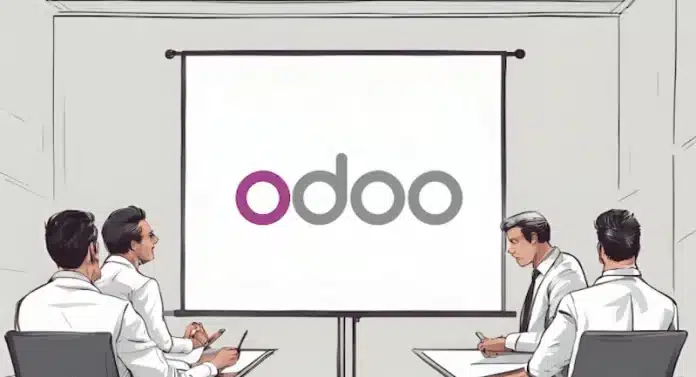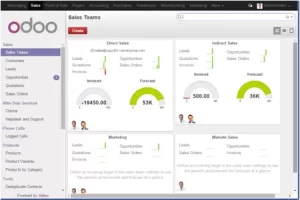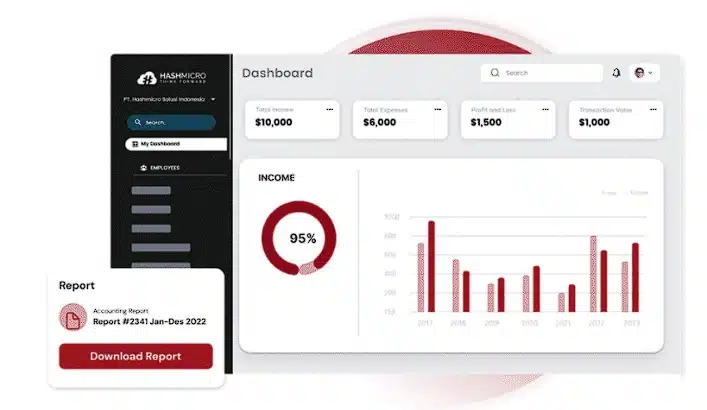In today’s rapidly changing digital landscape, more businesses are transitioning to Enterprise Resource Planning (ERP) systems to streamline operations and improve overall efficiency One popular ERP solution among companies in Singapore is Odoo ERP. This open-source management system is known for being user-friendly and easily integrated with various business needs.
In this article, we’ll offer an in-depth Odoo review to help you determine if it’s the right solution for your business. Whether you’re in the process of selecting a new ERP system or reevaluating your current one, we’ll address key questions to guide your decision-making.
Table of Contents
Key Takeaways
|
What is Odoo ERP?
Odoo is an open-source ERP software that built for organizations of any scale, it significantly enhances and simplifies diverse operational processes across departments. Originally founded in Belgium in 2005 under the name Tiny ERP, it later became OpenERP before adopting its current name, Odoo. Odoo ERP is renowned for its modular structure, offering a variety of applications that can be customized to suit different business processes.
Its solutions range from sales and CRM to manufacturing, accounting, and warehouse management. By leveraging a flexible ERP solution like Odoo, businesses can better respond to market shifts and improve their competitive edge.
Hashy AI Fact

Need to know!
AI in ERP helps you to streamline your business processes by integrating various business activities into one single platform. One of them is Hashy AI ready to help you 24/7.
Get a Free Demo Now!
Pros and Cons of Odoo ERP
Before implementing the Odoo ERP system, it’s essential to understand its strengths and weaknesses. Below is a summarized overview of Odoo ERP’s pros and cons based on insights from The CFO Club.
Pros
Odoo ERP is known for being a versatile and all-encompassing business management solution. Here are its main advantages:
- Integrated Business Operations: Odoo is highly effective at consolidating various business functions, including sales, CRM, and accounting, into one unified platform, boosting overall operational efficiency.
- Tailored Business Solutions: The system allows businesses to select and customize applications to build a solution that perfectly aligns with their specific needs.
- Optimized Inventory Management: Odoo simplifies inventory control, reducing errors and improving warehouse efficiency.
- Improved Sales Analytics: The platform offers real-time tracking of sales performance, providing valuable insights for businesses to make informed, data-driven decisions.
- E-commerce Integration: It smoothly connects with e-commerce platforms, ensuring synchronization between online and offline operations.
- Community-Driven Development: Odoo benefits from constant innovations and updates driven by its active community. The platform also allows for extensive customization to meet specific business requirements.
- Risk-Free Trial: The “One App Free” plan gives businesses the chance to test a core Odoo function extensively before committing to a paid plan.
These advantages make Odoo ERP an excellent choice for businesses seeking a flexible, efficient, and scalable management system.
Cons
While Odoo ERP offers numerous advantages, it’s important to consider potential downsides that could impact its fit for your business:
- Steep Learning Curve: The extensive feature set of Odoo, while valuable, can make it challenging for users who are unfamiliar with ERP systems, leading to a significant learning curve.
- Customization Requirements: Although Odoo is highly flexible, some specialized business needs may require additional third-party applications to meet specific requirements and may require advanced technical skills or assistance from an Odoo partner.
- High Resource Usage: In certain configurations, Odoo can be resource-intensive, potentially slowing down other systems and affecting the overall efficiency of the ERP.
- Limited Free Plan: The “One App Free” plan restricts users to just one module, which may not provide a complete understanding of Odoo’s full capabilities.
- Cost Scalability: Odoo’s pricing structure is based on the number of users, meaning that costs can fluctuate as your team grows or shrinks.
While Odoo ERP is a popular open-source choice, it’s important to consider other ERP options as well, like Epicor (which we will discuss in depth in Epicor review), especially for businesses focused on manufacturing or distribution. Epicor provides robust features for industries with complex operations, similar to Odoo.
However, when you look for a more localized, user-friendly solution that’s built for specific industries, HashMicro ERP stands out. It integrates essential functions, from HR and finance to supply chain, while remaining intuitive and compliant with local business standards.
Key Features of Odoo ERP
Odoo ERP is an all-in-one platform designed to optimize business operations across multiple departments. Before exploring its details, it’s essential to understand the core features that make Odoo a popular choice for many organizations.
By reviewing these features alongside user feedback, you’ll gain a better understanding of how Odoo ERP can meet different business needs and expectations. Below is a summary of Odoo ERP’s key features:
Finance and Accounting
Odoo streamlines financial management through features such as automated bank feed synchronization, recurring invoice handling, and expense tracking. It supports multi-currency transactions and offers a variety of payment methods, making it ideal for global businesses.
Sales Management
The system improves the sales process with tools to create and send detailed quotes, including options for e-signatures and online payments. Quotes can be emailed directly to clients for faster communication and precise record-keeping.
E-commerce
Odoo’s e-commerce module includes a drag-and-drop editor and an AI-driven website configurator, making it simple to build professional online stores. With numerous themes and customization options, businesses can create a unique online presence.
Inventory and Supply Chain
Using a double-entry inventory system, Odoo enhances warehouse management, minimizes stock shortages, and boosts supply chain efficiency. This method ensures organized storage and smoother operations.
Manufacturing
Odoo provides tools for managing the manufacturing process, including bill of materials (BOMs), routing, work orders, and integration with inventory and production planning. It is suited for both small-scale custom manufacturing and larger production lines.
Project Management
Odoo’s project management module helps monitor project progress with task tracking, Gantt charts, and collaborative tools for team and stakeholder engagement.
Human Resources
The HR features in Odoo include an employee directory, time and attendance tracking, payroll integration tailored to specific countries, and tools for managing expenses and leave requests, making HR management more efficient.
These comprehensive features make Odoo ERP a powerful and flexible solution for businesses looking to boost productivity and efficiency.
Also check out: Top 12 Acumatica Alternatives in Philippines
Benefits of Odoo ERP
Utilizing the feature set of Odoo Enterprise Edition offers significant benefits for your business. Here are some key advantages based on insights from the Technology Evaluation Center (TEC) and The CFO Club:
- Comprehensive CRM Insights: Odoo offers a clear overview of essential CRM functionalities, saving time on extensive research.
- Transparent Feature Support: The system clearly indicates the level of support for each feature, highlighting both Odoo’s strengths and areas that may need improvement.
- Integrated Business Platform: With its modular structure, Odoo seamlessly combines various business operations—from CRM, sales, and inventory to accounting and website development—into a unified system, reducing the reliance on multiple software tools.
- Flexibility and Customization: Odoo’s open-source framework allows for significant customization to meet the unique needs of your business processes.
- Scalability for Growth: The modular design is perfect for expanding businesses, enabling you to start with the core apps and add more as your needs grow.
- Active Community Support: Odoo benefits from a vibrant community of users and developers, providing access to resources, forums, and a broad network of partners for assistance.
What is ERP Odoo best for?
Odoo ERP is widely recognized for its comprehensive open-source suite that includes modules for CRM, accounting, inventory, manufacturing, project management, and e-commerce, all within a unified platform. This integration allows businesses to streamline their operations and manage multiple functions more efficiently.
However, despite its wide-ranging features, Odoo can present challenges for some users, particularly due to its complexity and the need for extensive customization to cater to specific business requirements.
In comparison, HashMicro provides a more tailored approach, offering strong support and customization options specifically designed to address the needs of different industries. By adopting HashMicro’s solutions, businesses can benefit from a simplified ERP system that aligns more closely with their unique requirements.
Also read: Review Sage X3 ERP: Essential Insights for Growing Businesses
HashMicro: An Excellent ERP Software Solution Alternative for Your Business Needs
As an alternative to Odoo ERP, HashMicro distinguishes itself through its seamless integration capabilities and user-friendly interface, allowing businesses to efficiently manage operations. HashMicro provides solutions tailored to industry standards and local regulations, ensuring that companies using its products can operate effectively and in full compliance within the Indonesian business environment.
With over 1750 clients across various key industries in Indonesia, HashMicro has established its reputation as the best ERP software and reliable provider of business solutions. From financial management and production to sales and human resources, HashMicro ERP integrates all business functions into a single, comprehensive platform, allowing users to access crucial information quickly and easily.
Here are some of the key benefits of HashMicro that can contribute to your business success:
User-friendly interface
HashMicro’s ERP system features an intuitive design, offering a clean interface with organized icons and logical navigation. Users can easily access and manage different functions without difficulty.
This benefit enhances operational efficiency by enabling users to intuitively navigate the system and quickly access necessary information.
Comprehensive features with tailored customization
HashMicro provides a wide range of features that can be deeply customized to suit each business’s unique needs. This ensures businesses can optimize their ERP system according to specific processes.The platform also allows for scalability, enabling companies to adjust features based on growth or changes, making the ERP investment valuable over time.
Commitment to innovation and technology
HashMicro focuses on continuous innovation, delivering regular updates to ensure users have access to the latest solutions. This keeps the ERP system relevant in a changing market, minimizes data security risks, and reduces system downtime by maintaining the software with the latest security features and updates.
Unlimited users at no extra cost
Unlike many other ERP providers that charge based on user numbers, HashMicro offers unlimited user access without additional fees. This flexibility supports team expansion and role distribution without increasing licensing costs, while also allowing broad access to data across departments for better decision-making and collaboration.
Customer satisfaction as a priority
HashMicro prioritizes customer satisfaction, demonstrated through responsive and effective customer support. The support team is readily available to assist users with operational challenges and help them maximize the benefits of the ERP system. This approach leads to a positive user experience, ensuring businesses get the most out of their ERP system and optimize their return on investment (ROI).
Conclusion
In light of the advantages outlined in this Odoo review, HashMicro emerges as a highly capable and dependable alternative. It offers a customized ERP solution, making it an ideal choice for businesses looking to maximize their ERP investment.
Not only does HashMicro provide an intuitive user interface, but it also delivers comprehensive, end-to-end solutions that meet all business requirements. By choosing HashMicro as your ERP system, you’re opting for a solution trusted by numerous industry leaders in Indonesia, ensuring quality and supporting your business’s growth and sustainability.
With HashMicro, you’re gaining more than just software—you’re securing a partner dedicated to enhancing your company’s operational and strategic success. Ready to experience it? Try the free demo today!
Frequently Asked Questions About Odoo ERP
-
Is Odoo ERP suitable for all types of businesses?
Yes, Odoo ERP is flexible and can be customized to fit businesses of all sizes and industries, from small startups to large enterprises.
-
Is Odoo ERP cloud-based or on-premise?
Odoo ERP is available both as a cloud-based solution and as an on-premise system. The cloud version offers easier access and lower maintenance costs, while the on-premise version provides more control over your data and infrastructure.
-
How much does Odoo ERP cost?
Odoo ERP pricing is based on a modular system, where businesses pay for only the features they need. Prices vary depending on the number of users, modules selected, and whether you choose the cloud or on-premise version.




































